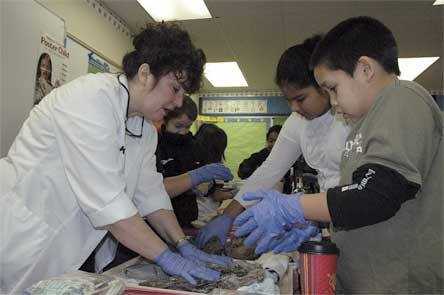TULALIP — Arlington-based registered nurse Kathy Ketchum was the original “Organ Lady” in 1989, and the “Choice and Consequence” program she started received $10,000 from the Tulalip Tribes this year.
On Dec. 16, Ketchum appeared at Tulalip Elementary, with human organs in hand, to give students a hand-on look at the consequences that their lifestyle choices can have on their bodies, as part of a $334,000 smoking cessation effort by the Tulalip Tribes Health Clinic.
“Throughout Indian country, we face an uphill battle in addressing the use of tobacco,” Tulalip Tribes Board Chair Mel Sheldon Jr. said. “On the prevention side, we do not have the same access to health care funding to counter these efforts.”
Casino revenues and Washington State Department of Health grant funding are supporting cessation efforts to reduce smoking in youth, persons with diabetes and pregnant women. Ketchum’s visit to Tulalip Elementary targeted youth by showing students two different sets of human organs — those that were healthy, and those damaged by smoking, drinking, drug use and other poor lifestyle choices.
Ketchum highlighted the vulnerability of the brain by recounting the seatbelt checks she did when her sons were still in school, and recalling how her one son thanked her for those checks after he suffered a car crash in high school. Although he’d been wearing a seatbelt, his lack of a shoulder strap resulted in brain damage that left him barely able to graduate from high school.
Ketchum explained that cigarettes contain 4,000 chemicals, 43 of which can cause cancer, while marijuana contains 5,000 chemicals, as many as 200 of which can cause cancer. She elaborated that, while cigarettes constrict blood vessels and cause high blood pressure, marijuana impairs the motivation necessary to achieve goals.
While smoking hardens the heart and destroys air sacs in the lungs that will never grow back, Ketchum added that chewing tobacco is no safer, since it causes gums to rot away and contains enough radioactive material to register on a Geiger counter.
Nadine Carter, Tobacco Cessation Program Coordinator for the Tulalip Health Clinic, expressed the hope that programs such as ‘Choice and Consequence will not only prevent children from taking up gateway drugs, but will also inspire the adults in their lives to drop their own bad habits.



